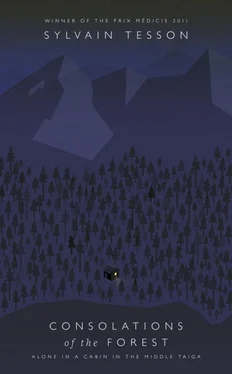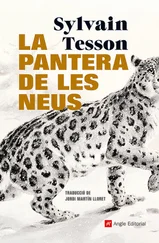22 MAY
The wind is busy cuffing a stretch of open water a third of a mile long that runs beside the shore. Beyond it, a chum of floating ice is driven by the west wind, and frozen sheets are snapping apart like loaf sugar soaked with champagne. The lake gives off a scent of sex.
Diggers, borers, crunchers, kneaders and burrowers, scratchers, those with claws, and drills, and beaks or proboscises, the crawlers, walkers, fliers, and those who perch on the back of a stronger creature, and the imitators, the disguisers, those of the night, the day and the twilight, those who see, those who smell: all are emerging from their torpor and coming to see the liberation of the waters the way friends welcome a prisoner the day he’s released from jail. Despite their long sleep, these creatures have not forgotten their roles and reflexes. The insect hordes are poised to invade the woods, and I feel less alone.
In a cabin, life takes on a counter-revolutionary tone. Never destroy, the hermit tells himself, in reactionary mode, but conserve and carry on. The recluse seeks peace, unity, renewal, and believes in the eternal return. Why break with anything, since everything will pass – and come around again? Does the cabin have a political meaning? Living here adds nothing to the community of men; the hermitage experience adds nothing to the collective study of how to get people to live together. Ideologies, like dogs, remain just outside the hermit’s door. Off in the woods – neither Marx nor Jesus, neither order nor anarchy, neither equality nor injustice. How could the hermit, preoccupied solely with the immediate, possibly care about foreseeing the future?
The cabin is not a base camp for reconquest but a hideout, a port of call.
A haven of renunciation, not a headquarters for fomenting revolution.
An exit door, not a point of departure.
A wardroom where the captain goes to drink a last glass of rum before the shipwreck.
The hole where the animal licks its wounds, not the burrow where it sharpens its claws.
23 MAY
Last night, at three o’clock, barking sent me rushing from the cabin, flare gun in hand. A bear was wandering on the beach. At dawn, its tracks on the grey sand.
The open water continues to bring off victories. This morning it extends for over six miles between the drift ice and my shore, and the wind is pushing the ice raft further out. The sun sparkles on the slush, while the beach remains in shadow. There’s no sight more joyful: the first sunbeams enter the cabin to dance around the floor. The sun fusses over me like the dogs. During the day, the eye gleans all these images that dreams will cook up later on.
According to Kierkegaard in his The Sickness unto Death , man knows three ages: those of aesthetic and don juanesque pleasure, Faustian doubt, and despair. To them must be added the age of withdrawal to the woods, as a sound conclusion drawn from the three earlier periods.
Around my neck I wear a small Orthodox cross, which shines in the sun when I chop wood with my shirt off. In my childhood I dreamed of a ‘Robinson Hood’ with a blond beard, who always wore on his breast the cross of Christ. I love that man who forgave adulterous women, strode along with his mouth full of pessimistic parables, denounced the bourgeois and went off to kill himself on a hill where he knew death was waiting for him. I feel I am a part of Christendom, those places where men – deciding to worship a god who preached love – allowed freedom, justice and reason to invade their cities. What holds me back, however, is Christianity, the name given to that tinkering with the Gospel by the clergy, that alchemy by sorcerers in tiaras ringing little bells that has transformed a burning message into a penal code. Christ should have been a Greek god.
24 MAY
Last night I dreamed of a bear attack. They were jumping on the cabin roof, as agile as cats and as svelte as Afghan hounds. Pretty damn horrible. I suspect the newly pervasive smell of algae in the atmosphere of influencing my dreams and nudging them into Gothic territories.
A squadron of tufted ducks alights on a sheet of open water edged by three enormous festoons of ice, then takes off in perfect formation in the direction of Mongolia. A pair of mergansers likes it here in my bay. I spend hours peering through my binoculars studying their punkish crests. Some diving Harlequin ducks come in for a full-tilt landing on a narrow canal. These ducks are dressed to kill, and when they fly off you just know they know where they’re going.
At eight every evening, the sunlight manages to slip into a notch in the peaks to the south and shoot a long stream of russet gold onto the velvety foliage of the thorn bushes. I’m not interested in knowing whether God or chance is responsible for such beauty. Must you know the cause to enjoy the effect?
In the evening, I dine outdoors, before a bonfire out on the beach. Then I stay to watch the flames with the dogs, my hands warm in their fur, until the moon over the mountain gives the signal to go to bed.
25 MAY
I spend hours smoking in my hammock at the top of the hill, with the dogs in faithful attendance. In Paris, my loved ones think I’m wrestling with the Siberian cold, panting at my chopping block to cut wood in a blizzard.
The lake: a blue-leaded window with alabaster panes. Scales of ice glide towards the south. Lying out in the mild air, I watch these watery flocks on the move. Between the scales, the colour of the water changes from hour to hour. Two sheldrakes zip over this leprous display so fast that I wonder if something is hot on their heels, or if they have some important meeting to attend… Why would anyone rather look at birds through a gun sight instead of binoculars?
26 MAY
People who find time’s swift passage painful cannot bear the sedentary life. In activity, they find peace. As the scenery streams past, they feel that time is slowing down. Their lives become a journey that never ends.
The alternative is the hermitage.
I never tire of studying my landscape. My eyes know each nook and cranny there and still explore them eagerly every morning as if discovering them for the first time. I look for three things: fresh nuances in this well-explored tableau; deeper understanding of my remembered idea of the place; confirmation that my move here was a wise decision. Immobility compels me to perform this exercise of virginal observation. If I neglect it, I open the door to the longing to go elsewhere.
One never tires of grandeur: an ancient sedentary principle. And anyway, why complain? Things are not as static as they seem: light fine-tunes beauty, transfigures it. Beauty may be cultivated, and renews itself day after day.
Travellers in a hurry need change. The sight of a patch of sunshine on a sandy hillside is not enough for them. Their place is on a train, before a television, but not in a cabin. In the end, along with vodka, bears and storms, the ‘Stendhal syndrome’ – or hyperkulturemia, psychosomatic suffocation at the sight of overwhelming beauty – is the only danger threatening the hermit.
27 MAY
It takes me seven hours to toil up a crumbling ridge covered with dwarf pines, spongy lichens and flakes of schist to gain the summit that crowns my ‘white valley’ at 6,560 feet. On the other side, the verso of my recto world. The other side is, always, a promise. One takes a look at it as if tossing out a net: to cement the certitude of going there one day to look around. Back down from the mountain, we carry that pledge alive in us: a part of our gaze is still up on the mountaintop…
Lying close to each other on the stones at the summit, the dogs stare at the landscape. They are contemplating it, I’d put my hand in a fire on that. Little dogs are ‘poor in world’, Herr Heidegger? No, only stripped down to the most accurate part of their knowledge, completely confident in the moment and careless of all abstraction. The courage of dogs: to look straight at what appears before them, without wondering if things could have been otherwise. I think about men’s efforts to deny all consciousness to animals. Thousands of years of Aristotelian, Christian and Cartesian philosophy lock us into the conviction that an insurmountable divide separates us from beasts. They lack morality: their actions – even their altruistic behaviours – are considered devoid of intentionality. They live without any suspicion of their own mortality. Adapted to their environment, they are incapable of opening themselves to the whole of reality, and will never have any notion of the world. The animal is merely an impoverished will, without any representation of its surroundings. Chained to the immediate, unable to transmit anything, the animal supposedly deprives itself of history and culture. And the philosophers keep bashing us over the head with the claim that no one has ever seen a monkey interpret a natural scene symbolically or express any aesthetic judgement.
Читать дальше












